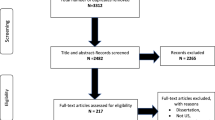Abstract
Despite advances in our understanding of HIV transmission and optimal treatment of people with HIV infection, stigmatizing attitudes are a significant barrier to HIV prevention and treatment. Several studies demonstrate that stigma directed towards people with HIV infection presents an obstacle to getting tested for HIV, obtaining optimal HIV care, and engaging in safe sex practices. We review the literature on individual and societal factors associated with HIV-associated stigma and propose a framework for intervention design.
Similar content being viewed by others
References and Recommended Reading
HerekGM, Capitanio JP, Widaman KF: HIV-related stigma and knowledge in the United States: prevalence and trends, 1991–1999. Am J Public Health 2002, 92:371–377. This population-based telephone survey examines attitudes towards people with HIV infection.
Herek GM, Mitnik L, Burris S, et al.: AIDS and Stigma: a conceptual framework and research agenda. AIDS Public Policy J 1998, 13:36–47.
Chesney MA, Smith AW: Critical delays in HIV testing and care: the potential role of stigma. Am Behav Sci 1999, 42:1162–1174.
Snyder M, Omoto AM, Crain AL: Punished for their good deeds: stigmatization of AIDS volunteers. Am Behav Sci 1999, 42:1175–1192.
Wolitski RJ, Rietmeijer CAM, Goldbaum GM, Wilson RM: HIV serostatus disclosure among gay and bisexual men in four American cities: general patterns and relation to sexual practices. AIDS Care 1998, 10:599–610.
Van der Straten A, Vernon KA, Knight KR, et al.: Managing HIV among serodiscordant heterosexual couples: serostatus, stigma and sex. AIDS Care 1998, 10:533–548.
Kalichman SC: Understanding AIDS: Advances in Research and Treatment. Washington, DC: American Psychological Association; 1998.
Kalichman SC, Nachimson D: Self-efficacy and disclosure of HIV-positive serostatus to sex partners. Health Psychol 1999, 18:281–287.
Golin C, Isasi F, Bontempi JB, Eng E: Secret pills: HIV-positive patients’ experiences taking antiretroviral therapy in North Carolina. AIDS Educ Prev 2002, 14:318–329.
Zierler S, Cunningham WE, Andersen R, et al.: Violence victimization after HIV infection in a US probability sample of adult patients in primary care. Am J Public Health 2000, 90:208–215.
The Oxford English Dictionary. Oxford: The Clarendon Press; 1933.
ParkerR, Aggleton P: HIV and AIDS-related stigma and discrimination: A conceptual framework and implications for action. Soc Sci Med 2003, 57:13–24. A thoughtful, conceptual model for evaluating the role of structural factors in the perpetuation of HIV-associated stigma.
Goffman E: Stigma: Notes on the Management of Spoiled Identity. New York: Simon & Schuster; 1963.
Dovidio JF, Major B, Crocker J: Stigma: introduction and overview. In The Social Psychology of Stigma. Edited by Heatherton TF, Kleck RE, Hebl MR, Hull JG. New York: The Guilford Press; 2000.
Crocker J, Major B: Social stigma and self-esteem: the self-protective properties of stigma. Psychol Rev 1989, 96:608–630.
Allison KW: Stress and oppressed social category membership. In Prejudice: The Target’s Perspective. Edited by Swim JK, Stangor C. San Diego: Academic Press; 1998.
Feingold A: Good-looking people are not what we think. Psychol Bull 1992, 111:304–341.
Porter JR, Washington RE: Black identity and self-esteem: a few studies of black self-concept. Ann Review Sociol 1979, 5:53–74.
Dovidio JF, Gartner SL: On the nature of contemporary prejudice: the causes, consequences, and challenges of aversive racism. In Confronting Racism: The Problem and The Response. Edited by Eberhardt JL, Fiske ST. Thousand Oaks: Sage; 1998.
Jones E, Farina A, Hastorf A, et al.: Social Stigma: The Psychology of Marked Relationships. New York: Freeman; 1984.
Miller CT, Major B: Coping with stigma and prejudice. In The Social Psychology of Stigma. Edited by Heatherton TF, Kleck RE, Hebl MR, Hull JG. New York: The Guilford Press; 2000.
BrownL, Macintyre K, Trujillo L: Interventions to reduce HIV/AIDS stigma: what have we learned? AIDS Educ Prev 2003, 15:49–69. A meta-analytic review of interventions designed to reduce stigma.
Ashworth CS, DuRant RH, Gaillard G, Rountree J: An experimental evaluation of an AIDS educational intervention for WIC mothers. AIDS Educ Prev 1994, 6:154–162.
Bean J, Keller L, Newburg C, Brown M: Methods for the reduction of AIDS social anxiety and social stigma. AIDS Educ Prev 1989, 1:194–221.
Foucault M: Prison talk. In Power/Knowledge: Selected Interviews and Other Writings, 1972–1977 Michel Foucault Edited by Gordon C: New York: Pantheon; 1980.
Gordon C: Histoire de la folie: An unknown book by Michel Foucault. In Rewriting the History of Madness: Studies on Foucault’s Histoire de la Folie. Edited by Still A, Velody I: London: Routledge; 1992.
Foucault M: Two lectures. In Power/Knowledge: Selected Interviews and Other Writings, 1972–1977 Michel Foucault Edited by Gordon C: New York: Pantheon; 1980.
Stokols D: Translating social ecological theory into guidelines for community health promotion. Am J Health Promotion 1996, 10:282–298.
Minkler M: Community-based research partnerships: challenges and opportunities. J Urban Health. 2005, 82(Suppl2):ii3-ii12.
Minkler M: Ethical challenges for the "outside" researcher in community-based participatory research. Health Educ Behav 2004, 31:684–697.
Hightow LB, Miller WC, Leone PA, et al.: Failure to return for HIV posttest counseling in an STD clinic population. AIDS Educ Prev 2003, 15:282–290.
Geretti AM, Smith M, Watson C, et al.: Primary antiretroviral resistance in newly diagnosed patients with established heterosexually acquired HIV-1. AIDS 2002, 16:2358–2360.
Author information
Authors and Affiliations
Rights and permissions
About this article
Cite this article
Kaplan, A.H., Scheyett, A. & Golin, C.E. HIV and stigma: Analysis and research program. Curr HIV/AIDS Rep 2, 184–188 (2005). https://doi.org/10.1007/s11904-005-0014-6
Issue Date:
DOI: https://doi.org/10.1007/s11904-005-0014-6




